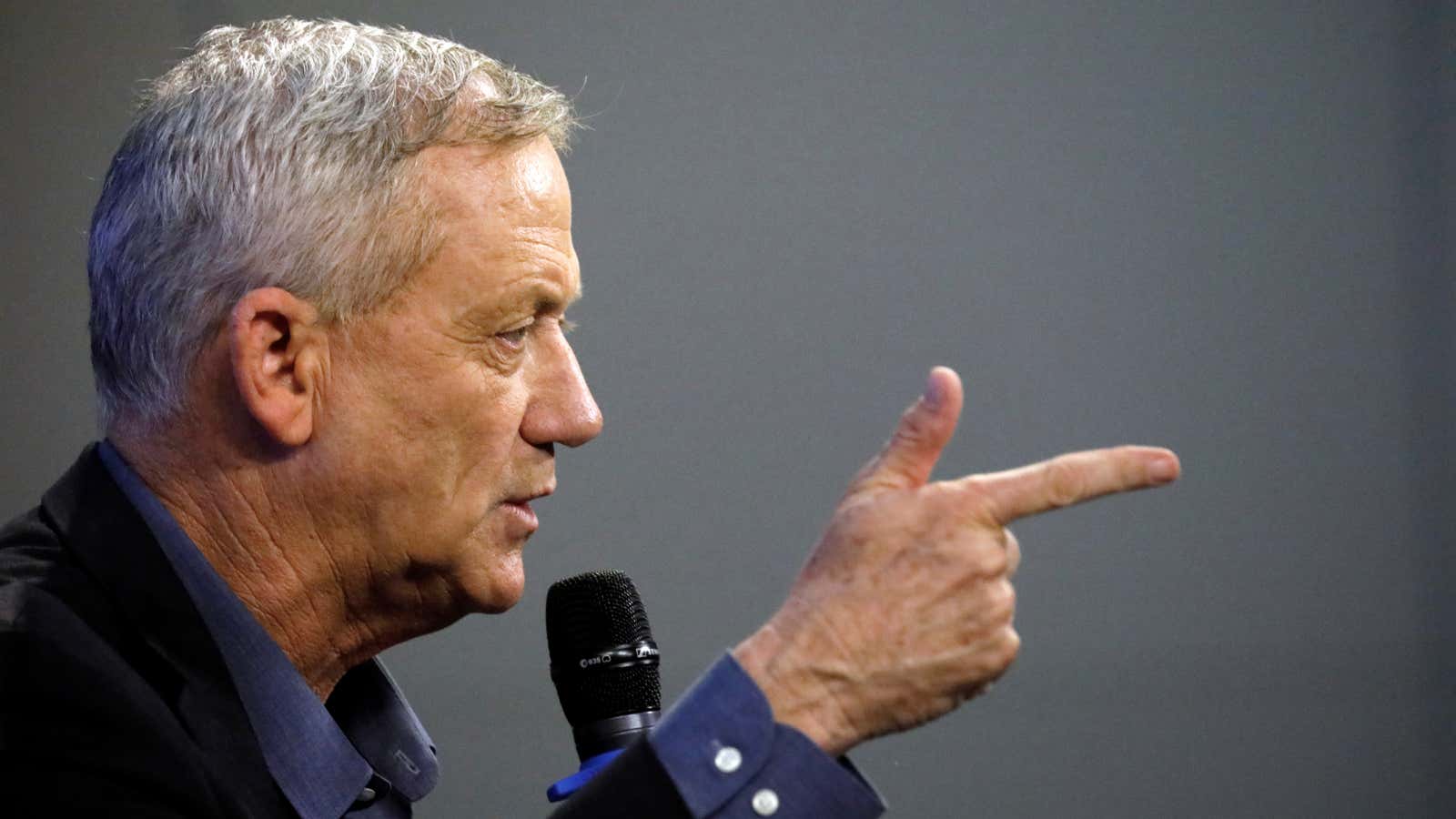On April 9, Israel’s polls will be filled with voters—at least those who aren’t boycotting the elections. Those voters will be deciding, among other things, who the next prime minister will be and that could very well determine whether peace in the Middle East will always just be a dream or could someday be a reality.
The election pits the current prime minister, Benjamin Netanyahu, who leads the right-wing Likud party, against Benny Gantz, a centrist candidate of the recently formed “Blue and White” party. Gantz is the former general chief of staff of the Israeli Defense Forces, which means his pro-peace stance has legitimacy even among some voters who are security-minded. Gantz’s party has argued for a repeal of the “Jewish nation-state law” passed last year that marginalizes non-Jewish citizens, and has pledged to move forward diplomacy with Palestinians and Arab neighbors, writing in its charter, “We will initiate a regional conference with the Arab countries that seek stability, and deepen the process of separation from the Palestinians while maintaining the uncompromising security interests of the State of Israel.”
Netanyahu faces corruption charges for bribery, fraud, and brach of trust, criminal accusations that undermine his candidacy. But that doesn’t necessarily mean Gantz will win or, even if he does, that he’ll have the political power to form a parliamentary coalition that could lead Israel back to the negotiating table with Palestinians.
One big factor that could affect the outcome of the election (paywall): whether or not Palestinian voters show up to the polls. Eligible Palestinian voters make up 17% of the electorate, but many have decried the elections and called for a boycott. Some argue that by voting in Israeli elections, they simply provide a veneer of democratic legitimacy to the state while undermining the plight of Palestinians in the occupied territories. Others, like the rapper Tamer Nafar, concede that their vote won’t change everything, but says participation may have positive effects nonetheless. In a song (paywall) that illuminates his own personal debate over participation Nafar says, voting “doesn’t mean that we’ll liberate Palestine.” But voting could help unseat Netanyahu and that, he believes, would be progress.
Netanyahu, for his part, is doing his darndest to galvanize the right. On April 6, he announced in an interview with Israel’s channel 12 news that, if reelected, he plans to annex Israeli settlements in the West Bank, as he’s done with territories in Jerusalem and the Golan Heights captured by Israeli forces in the 1967 war. “I am going to extend (Israeli) sovereignty and I don’t distinguish between settlement blocs and the isolated settlements,” he said. In other words, Netanyahu plans to grow the state in bits and pieces, creating Israeli territorial pockets in areas that would arguably belong to Palestine if that state is created.
Flying in the face of international expectations has been Netanyahu’s modus operandi. And he’s had some support for his efforts, most notably from US president Donald Trump who officially moved the US embassy in Israel from Tel Aviv to Jerusalem last year, a symbolic move with real-world implications. By doing this, Trump legitimized Netanyahu’s claim that Jerusalem belongs to the Jewish state, which infuriated much of the international community. Jerusalem is a major sticking point in peace talks between Israel and the Palestinians and the city is not widely recognized as Israel’s capital—nations that have embassies in Israel situate them in Tel Aviv for that reason.
In March, Trump recognized Israel’s sovereignty over the Golan Heights—territory Israel captured from Syria in 1967—which only fanned the flames of outrage among those who hope for a return to the negotiating table for peace talks and the formation of a Palestinian state. Netanyahu’s positions, and the support Trump gives them, make the prospect of peace negotiations seem fraught, if not impossible.
According to a March 24 poll by the Guttman Center for Public Opinion and Policy Research at the Israel Democracy Institute, two-thirds (66%) of the Jewish Israeli public thinks the US recognition of Israeli sovereignty over the Golan boosts Netanyahu’s standing in the current election campaign. And Netanyahu’s popularity has risen from 35% to 39% with those voters in the institute’s polls since December.
Netanyahu claims that his opponent, Gantz, is a weak centrist who will make territorial concessions to Palestinians for peace. His announcement of annexations on Saturday may prove to be just the thing to convince right-wing voters who distrust the prime minister because of corruption charges, which he has vehemently denied, to give Bibi yet another shot.
